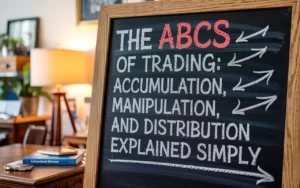In trading, controlling your emotions is key, more so with a funded account. Learning to manage your feelings can improve your decisions and success. It helps you stay focused and avoid making choices based on fear or greed. This guide will teach you how to control your emotions. You’ll learn strategies to help you trade better. It’s all about making smarter choices in your trading.
Understanding the Importance of Emotions in Trading
Emotions are key in trading. Knowing how emotions affect our choices is vital. Fear can make us act too fast, missing chances or losing money. On the other hand, being too sure of ourselves can lead to taking big risks. These risks might not fit our plans.
Knowing our emotions helps us make better choices in trading. It lets us avoid acting on impulse. This way, we can make smarter decisions and avoid big losses. Being disciplined with our emotions is also important for success. Traders who can manage their feelings do better in the long run. They stick to their plans, even when things get tough.
For more on maintaining a disciplined mindset, explore the importance of consistency in trading performance.
How to Control Emotions While Trading a Funded Account
Controlling emotions in trading is key to success, more so with a funded account. Traders can use strategies to manage their feelings. These strategies help keep emotions in check. Setting exit points is a good start. It helps avoid making quick, risky decisions. A clear plan keeps traders focused, even when emotions try to distract.
Mindfulness practices are also helpful. Deep breathing and positive thinking can calm the mind. They help traders stay focused and positive. Using these methods builds emotional strength. It helps traders bounce back from losses. This leads to better trading and less stress.
Mastering emotional control is especially useful when applying trading strategies for funded accounts.
The Role of Emotional Regulation in Trading Psychology
Emotional regulation is key in trading. It helps traders make better choices and succeed. Traders often feel a lot of pressure, leading to bad decisions. Good emotional control leads to better trading.
Knowing yourself is important for traders. It helps them understand their feelings before trading. Feeling scared or greedy can lead to better choices. Controlling impulses is also key. It helps traders not act on quick emotions. This is very important for those trading with a lot of money.
Using emotional control can reduce losses in tough markets. Staying calm helps traders follow their plans. This makes them better traders and creates a better trading space. Practices like mindful breathing help too. They make traders calm and focused. Good emotional skills are very important for success in trading.
Check out the frequently asked questions to learn how traders at The Prop Vault handle performance pressures.
Key Trading Psychology Tips for Emotional Discipline
Emotional discipline is key for trading success. Traders need to follow some important tips to control their emotions. Keeping a trading journal helps track decisions and feelings. Writing down how you feel about each trade helps you think about your actions. It helps you see patterns in your emotions.
Setting goals that are realistic keeps you motivated. Aim for small improvements instead of big profits. This way, you avoid getting too stressed. Staying consistent in your trading routine helps too. It makes you less likely to make quick, emotional decisions.
It’s important to learn from mistakes without getting too upset. Look at your mistakes objectively to learn from them. This way, you grow stronger and better at controlling your emotions.
Understand the pros and cons of different styles in mechanical vs discretionary trading.
Managing Emotions in Trading: A Step-by-Step Approach
Managing emotions in trading needs a clear plan. Traders can use strategies to handle their feelings better. Start by watching your emotions closely. Keeping a trading journal helps a lot. It tracks your feelings before, during, and after trades. Looking back at your journal helps you see patterns and what makes you feel certain ways.
Then, check the market conditions. Knowing how the market feels can help you guess how you might feel. If the market gets wild, you might feel like making quick decisions. Being ready for this helps a lot. Having a plan for when you feel stressed or anxious is key. This plan should say what to do when you feel overwhelmed. For example, if you’re losing money, you might take a break or look closely at your trades to find out why.
It’s also important to keep checking how you feel. Looking at your emotional responses often helps you see how you’re growing. By managing your emotions step by step, you can get better at trading.
Learn how you can trade effectively even with no minimum trading days, with discipline being a core requirement.
Emotional Control Techniques for Funded Account Traders
Emotional control is key for funded account traders to succeed. Using good emotional management can help a lot. Here are some ways to better control your emotions while trading.
- Visualization Techniques: Imagine yourself making good trades and feeling happy. This gets your mind ready for different situations.
- Meditation Practices: Meditating often can calm your mind and help you focus. It lets you handle your feelings before making quick choices.
- Accountability Partners: Having a trading buddy can motivate you and give new ideas. Talking about your day helps you stay on track.
- Technology Integration: Trading apps that track your feelings can keep you calm. They help you see how you’re doing and change your plan if needed.
Using these strategies can make your trading better. Each one has its own benefits. They help you stay calm when things get tough.
See how funded traders succeed through emotional control in instant funded challenges.
Developing a Mindset for Trading Success
Being a good trader is more than knowing about markets. It’s about managing your feelings well. This is called emotional intelligence for trading. It helps you deal with market changes. Being strong and believing in yourself is important. This is true for anyone trying to keep a funded account.
To get a good mindset, traders can try a few things:
- Positive Affirmations: Say good things about your trading skills often. This boosts your confidence and helps you stay positive.
- Goal-Setting: Make clear goals for yourself. This helps you stay focused and see how you’re getting better.
- Visualization Techniques: Imagine yourself doing well in trading. This builds your confidence and helps you stay positive.
It’s also important to see losses as chances to learn. Mistakes can teach you a lot. By seeing them this way, you stay calm and keep moving forward. Explore our About Us page to understand the mindset we promote at The Prop Vault.
Keeping Emotions in Check While Trading
Trading well means keeping your emotions steady. It changes how you make decisions. Traders face tough market times that test their calm. Short breaks help keep focus and lower stress. Stepping back clears your mind. It helps you come back focused.
Exercise is great for managing feelings. It makes you feel better and helps you stay calm. Being thankful might seem odd in trading. But it helps keep a positive outlook. Thinking about your wins helps fight off bad feelings.
Need extra support? Visit our contact page to connect with our team or ask questions.
Emotional Intelligence in Finance: Why It Matters
Emotional intelligence is key in finance. It helps traders make better choices. Traders with high emotional intelligence stay calm and make smarter decisions. Knowing how to handle emotions is important. It helps traders do well and work well with others. This makes trading teams stronger and more successful.
Being aware of your feelings and others’ is important. It makes traders more flexible and better at handling changes. Traders who focus on emotional intelligence do well and help their teams too.
Discover how accumulation, manipulation, and distribution affect emotional decision-making in the markets.
Effective Emotional Management Strategies for Traders
Trading can feel like a wild ride of emotions. It’s key for traders to manage their feelings well to do well. Techniques like progressive muscle relaxation help reduce tension when things get tough.
This lets traders stay sharp, not get caught up in stress. Positive self-talk is also a big help. It turns bad thoughts into useful lessons, making traders stronger. Doing things outside of trading hours is important too. Activities like exercise, mindfulness, or hobbies can clear the mind. They get traders ready for the trading day ahead.
Having a set routine is also helpful. A pre-trading checklist that includes getting mentally ready helps match emotions with goals. This way, traders can better manage their feelings and do well.
Pair strong emotional management with our 8% drawdown challenge for greater long-term success.
Building Emotional Resilience in Trading
Building emotional resilience in trading is key. It helps traders deal with the ups and downs of the market. A strong trading mindset helps them bounce back from losses and stay focused on their goals. Stress management is important for traders. They can try mindfulness, exercise, and good time management. These help them see challenges as chances to learn, not as failures.
Reflecting on trading experiences is also helpful. Traders can look back at their trades and figure out what makes them emotional. This helps them make a plan to stay calm and confident in the market. Building emotional resilience is a journey. Traders need to keep working on their strategies and celebrate their wins. This journey makes trading more rewarding and helps them perform better.
Reinforce your learning by visiting the general FAQs about how to stay resilient through challenges.
Funded Account Trading Psychology: Overcoming Challenges
Traders with funded accounts often face big mental hurdles. The need to make money can make them very stressed. This stress can mess up their decision-making. Feeling scared of losing money can make things worse. It can make it hard to think clearly. Knowing how to handle these feelings is key.
To beat these challenges, traders need to first know their emotions. It’s important to recognize feelings like fear, anxiety, or being too confident. Using emotional intelligence can help them manage their feelings better. Practices like mindfulness or keeping a journal can help. They make traders more aware of their emotions. This helps them stay calm and balanced.
It’s also important to have realistic expectations about trading. Trying to be consistent is better than just making money. Setting goals that are reachable helps too. It shows that losing money is part of the game. In short, traders can do better by focusing on their emotional strength. Understanding the mental challenges of funded account trading is key. This helps them succeed in the market.
Visit the 10% drawdown challenge FAQ to see how mental strength plays a role in sustained performance.
Strategies to Control Emotional Decision-Making in Trading
It’s key to control emotions when trading, even more so in funded accounts. By setting clear rules, traders can avoid acting on fear or greed. This helps them make better choices and stay calm. Alerts are a smart way to stay focused. They tell traders when big market changes happen. This helps them avoid making rash decisions during busy times.
Using limit orders is another good strategy. These orders set when to buy or sell, making trading more systematic. It helps traders follow their plans and stay disciplined. Technology helps traders manage their emotions better. By using these strategies, traders can handle market ups and downs with confidence.
Back your trading rules with smart account types like the 12% drawdown challenge, which rewards consistency and discipline.
Tips for Emotional Control in Funded Trading Environments
Keeping your emotions in check is key in funded trading. Good tips can really help your trading. Start by making a daily plan for your trading. This helps you avoid acting on emotions too quickly. Also, use stats to check how you’re doing. Tracking your trades helps you see when emotions get the best of you. This way, you can manage your feelings better.
Try mindfulness and visualization to stay calm. Mindfulness keeps you in the moment, reducing worries about the past or future. Visualization gets you ready for different trading situations, helping you stay focused. Lastly, join a community of traders. Sharing stories and learning from others keeps you grounded. These tips can make your trading better and more enjoyable.
Browse our shop for trading tools that support a calm and prepared trading approach.
Conclusion
Learning to control emotions while trading a funded account is key to success. It helps make better decisions. This is why it’s important to use good strategies in your trading. Understanding and using trading psychology tips can help. It makes it easier to handle market ups and downs. This way, traders can stay strong and focused.
Managing emotions helps avoid quick, bad decisions. It also leads to a more careful approach to risk. Techniques like visualizations and mindfulness help. They help traders stay calm and follow their plans. Managing emotions is a long journey that needs patience and practice. By using these tips, traders can make better choices. This leads to better results in trading.
By focusing on emotional control, traders can do well in tough markets. This ensures they succeed in funded account trading.
FAQ
How can I control my emotions while trading a funded account?
To control your emotions, set exit points before trading. Stick to your trading plan. Try deep breathing or meditation to stay calm.
What role does emotional regulation play in trading psychology?
Emotional regulation is key in trading psychology. It helps avoid big losses and boosts performance. By control emotions, you can make better trades.
Can keeping a trading journal improve my emotional discipline?
Yes, a trading journal helps a lot. It lets you think about your trades and emotions. You learn from mistakes and get better over time.
What are some effective emotional management strategies for traders?
Good strategies include learning to handle stress and relax. Use positive words to yourself. Also, take care of yourself outside of trading.
How can I develop emotional resilience in trading?
Build resilience by bouncing back from losses. Manage stress well. Think of yourself as always growing. This helps you face trading challenges.
What strategies can help control emotions decision-making in trading?
Use strict trading rules and set alerts. Use limit orders to avoid emotional trades. A clear plan helps you make better choices.
Why is emotional intelligence important in finance?
Emotional intelligence is key in finance. It helps you understand your feelings and others’. This is important for working well with others and succeeding in trading.
What are some tips for maintaining emotional control in funded trading environments?
Keep a regular trading schedule. Use stats to check your performance. Practice staying calm, like taking breaks when stressed.










